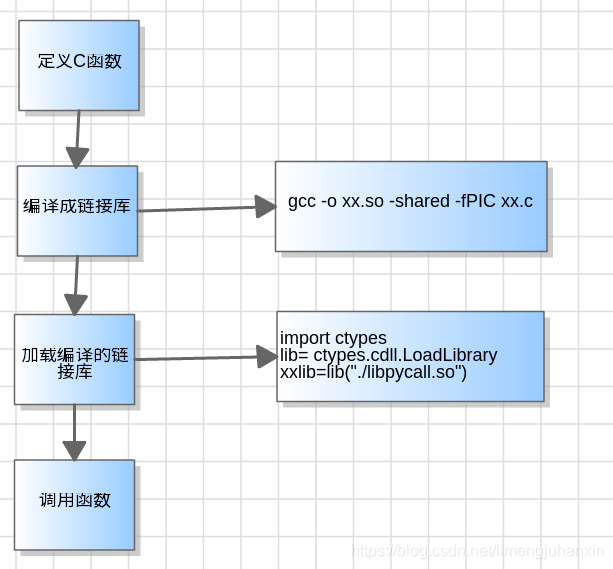python库和C语言是相互对应的,两者可以相互调用
PYTHON调用C/C++
PYTHON调用C

cftest.c
int cf_test()
{
printf("hello python!\n");
return 0;
}
import ctypes
lib = ctypes.cdll.LoadLibrary
cflib = lib("./libcftest.so")
cflib.cf_test()
执行如下代码:
gcc -o libcftest.so -shared -fPIC cftest.c
python cfcall.py
最终输出:hello python!
PYTHON调用C++
将C++进行extern "c"进行声明即可;
PYTHON调用可执行程序
cexe.c
#include<stdio.h>
void hello(char *str)
{
printf("hello %s\n",str);
}
int main(int argc ,char *argv[])
{
if(argc==2)
{
hello(argv[1]);
}
else
{
printf("bye\n");
}
return 0;
}
import os
main = "./cexe"
os.system(main + " python")
执行下面的代码
gcc cexe.c -o cexe
python cexecall.py
输出 hello python
C/C++扩展Python
对于包装代码有四步:
- 包含python.h文件
- 为每个函数增加PyObject *xx_func()的包装函数
- 为每个模块增加一个PyMethodDef xxMethods[]数组
- 增加模块初始化函数void initModule()
对于编译代码
创建编译代码的compile.py
from distutils.core import setup, Extension
MOD = 'xx'
setup(name=MOD, ext_modules=[Extension(MOD, sources=['xxx.c'])])
创建应用程序
创建cpack.c
#include<stdio.h>
void python()
{
printf("hello python\n");
}
void c()
{
printf("hello c");
}
封装
对cpack.c里的函数进行封装
cpack.c
#include<stdio.h>
void python(void)
{
printf("hello python\n");
}
void c(void)
{
printf("hello c");
}
#include<Python.h>
static PyObject *cpack_python(PyObject *self ,PyObject *args)
{
python();
return (PyObject*)Py_BuildValue("");
}
static PyObject *cpack_c(PyObject *self ,PyObject *args)
{
c();
return (PyObject*)Py_BuildValue("");
}
static PyMethodDef cpackMethods[]=
{
{"python",cpack_python,METH_VARARGS},
{"c",cpack_c,METH_VARARGS},
{NULL,NULL},
};
void initcpack(void)
{
Py_InitModule("cpack",cpackMethods);
}
编译
from distutils.core import setup, Extension
MOD = 'cpack'
setup(name=MOD, ext_modules=[Extension(MOD, sources=['cpack.c'])])
python2 compile.py build
编译完成后在./build/*lib/文件下
执行
像调用模块一下调用
C/C++调用PYTHON
编写python文件c_add.py
def hello(str):
print("hello " + str)
添加到c文件cpy.c
#include<Python.h>
int main()
{
Py_Initialize();
PyRun_SimpleString("import sys");
PyRun_SimpleString("sys.path.append('./')");
PyObject *pName = NULL;
PyObject *pModule = NULL;
PyObject *pDict = NULL;
PyObject *pFunc = NULL;
PyObject *pArgs = NULL;
pName = PyString_FromString("c_add");
pModule = PyImport_Import(pName);
if(!pModule)
{
printf("failed\n");
return -1;
}
pDict = PyModule_GetDict(pModule);
pFunc = PyDict_GetItemString(pDict,"hello");
pArgs = PyTuple_New(1);
PyTuple_SetItem(pArgs,0,Py_BuildValue("s","python"));
PyObject_CallObject(pFunc,pArgs);
Py_DECREF(pName);
Py_DECREF(pArgs);
Py_DECREF(pModule);
Py_Finalize();
}
编译
gcc -I/usr/include/python2.7 cpy.c -o cpy -L/usr/lib -lpython2.7
执行